Iraq Situation Report: June 30 - July 01, 2015
July 1, 2015 - Sinan Adnan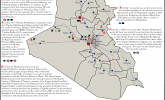
Various Iraqi Shi’a militias along with the Federal Police (FP) and elite units from the ISF appear to have made advances against ISIS in Baiji.

Various Iraqi Shi’a militias along with the Federal Police (FP) and elite units from the ISF appear to have made advances against ISIS in Baiji.
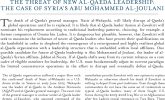
The death of al-Qaeda’s general manager, Nasir al-Wahayshi, will likely disrupt al-Qaeda’s global operations until he is replaced. It is likely that al-Qaeda leader Aymen al-Zawahiri will nominate his replacement according to traditional leadership patterns. It is dangerous but plausible, however, that Zawahiri will seek to maximize the influence of newer al-Qaeda leaders. One possible candidate for future al-Qaeda leadership is Abu Mohammed al-Joulani, the leader of al-Qaeda’s Syrian affiliate, Jabhat al-Nusra.
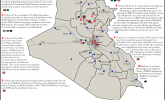
There have been unconfirmed reports of advances by the Federal Police (FP) and Iranian-backed Iraqi Shi’a militias in Baiji district amid renewed clearing operations declared by the FP.
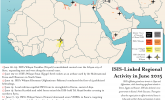
ISIS’s affiliates gained new terrain in Libya and Afghanistan, while launching significant attacks in Yemen, Egypt, and Kuwait. ISIS also declared a new governorate in Russia’s North Caucasus. These gains allow the organization to offset territorial losses in Libya and northern Syria and maintain its claim that it is “Remaining and Expanding” a year after the declaration of the Caliphate.
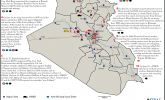
Grand Ayatollah Ali al-Sistani’s Shi’a religious establishment (Hawza) has issued new guidance that is likely to increase the size of the armed groups fighting under its supervision and ultimately its base of popular support.
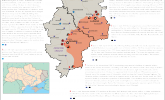
Russian backed Separatist forces have launched multiple unsuccessful assaults on Marinka, a Ukrainian held town near Donetsk.
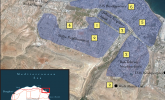
ISIS lost control of its primary Libyan stronghold in the eastern city of Derna on June 12. Local Islamist groups expelled ISIS from the city following ISIS’s assassination of a local leader. The loss of Derna is unlikely to affect ISIS’s military strategy in Libya, as the organization controls other cities along the central coast. However, it suggests that ISIS may struggle to maintain social control in cities outside of Iraq and Syria, as the organization ultimately seeks to do across the Middle East and North Africa.
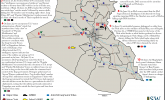
Diyala Province will likely become the renewed focus of security efforts amidst an ISIS resurgence in the province.